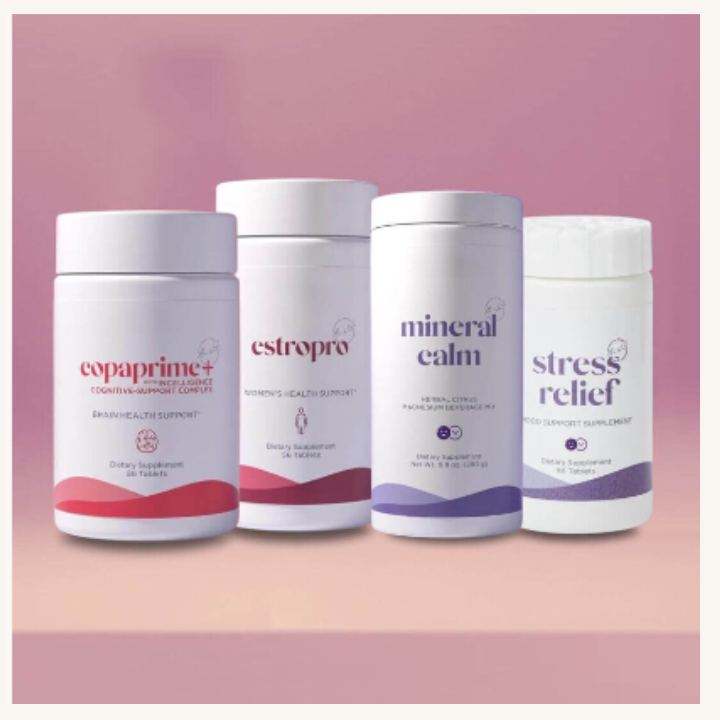Welcome to Menopause Hormone Health 101! Hormone health during menopause can be a complex topic, and it’s something that trips people up more than you might think. In my experience with clients, I’ve seen countless women tirelessly trying to balance one hormone only to feel frustrated when their symptoms persist. That’s because menopause hormone health is rarely about a single hormone—it’s a combination of adrenal health and cortisol, insulin balance, thyroid function, and sex hormones like estrogen, progesterone, and testosterone. Together, these hormones influence everything from mood and energy to metabolism and sleep.
In this guide, we’ll explore key hormones during menopause and how they interact, helping you navigate your journey with confidence. You’ll also find tips for managing common symptoms like hot flashes and fatigue by supporting your body’s hormone balance. For more, check out our previous blog on Common Menopause Symptoms.
1. Adrenal Health and Cortisol
In managing menopause hormone health, adrenal health plays a critical role because the adrenal glands produce cortisol, commonly known as the “stress hormone.” Supporting your adrenal health is a foundational piece of hormone balance during menopause. Our adrenals become the primary producers of estrogen and progesterone as our ovaries slowly step back, which means they work overtime during this stage. If you’re under a lot of stress, though, cortisol levels can spike, disrupting this delicate balance and leading to symptoms like fatigue, stubborn weight gain (especially around the belly), and that classic “menopause brain fog.” Sound familiar? Many menopause symptoms stem from similar hormonal imbalances, which is why understanding your adrenal health is so empowering.

Take one of my clients, Sarah, for instance. She was dealing with relentless fatigue, mood swings, and weight gain that just wouldn’t budge. After a close look at her lifestyle, we created a plan that focused on adrenal support with nourishing, anti-inflammatory foods, restorative movement, and a sustainable sleep routine. Just a few months in, Sarah felt a remarkable shift in her energy, her moods stabilized, and her body responded by finding its balance naturally.
When you take steps to reduce stress and nurture your adrenal health, it supports not only cortisol levels but also your overall hormone health—making this transition through menopause smoother and empowering you to feel like yourself again. For actionable tips on managing stress effectively, check out my blog on the six major types of stress and how to manage each one.
Tips for Adrenal Health:
- Prioritize Stress Management
- Incorporate practices like meditation, deep breathing exercises, or yoga to help reduce cortisol levels and ease adrenal strain.
- Get Quality Sleep
- Aim for 7-9 hours per night, as quality rest helps restore adrenal health and regulate cortisol.
- Limit Stimulants
- Reducing caffeine and sugar can help balance cortisol levels, as stimulants tend to spike cortisol and disrupt energy balance.
2. Insulin Balance

Another key component of menopause hormone health is insulin balance. Insulin is the hormone that helps regulate our blood sugar levels, which in turn influences sex hormones like estrogen and progesterone. If we’re regularly eating high-glycemic foods—think processed carbs or sugary snacks—it can cause blood sugar spikes and crashes. Over time, this rollercoaster effect can lead to insulin resistance, which, if left unchecked, may progress to pre-diabetes or diabetes, conditions that also raise the risk of heart disease. Noticing early signs, like that classic weight gain around the midsection, increased hunger, or constant fatigue, is crucial for staying ahead of these shifts.
Stabilizing insulin doesn’t just benefit your energy levels and weight; it also keeps your hormones in check and protects your long-term health. When we support insulin balance, we’re setting ourselves up for a healthier, smoother menopause transition.
Tips for Insulin Balance:
- Choose Low Glycemic Foods
- Opt for whole grains, lean proteins, healthy fats, and fiber-rich veggies to help maintain stable blood sugar levels.
- Stay Active
- Regular exercise increases insulin sensitivity, helping the body process glucose more effectively and promoting balanced insulin.
- Eat Balanced Meals
- Combining protein, fiber, and healthy fats in meals can help keep blood sugar levels steady and support overall hormone health.
3. Thyroid Function
Thyroid function is essential to menopause hormone health because the thyroid regulates metabolism, energy, and body temperature. Your thyroid plays a foundational role in hormone health during menopause, as it regulates metabolism, energy, and even body temperature. Many of the symptoms we often attribute solely to declining estrogen—like night sweats, fatigue, and hot flashes—can also be tied to thyroid health. This is why ensuring your thyroid is functioning well can make a big difference in how you feel.

I’ve seen this firsthand with friends who experienced constant fatigue and temperature fluctuations, not just the typical hot flashes. Once they had their thyroid levels checked and incorporated some simple dietary changes, such as adding more iodine-rich foods and reducing stress to support their thyroid, they felt a huge improvement.
Remember, your thyroid works in tandem with your other hormones, so keeping it in balance is essential for a smoother, healthier menopause transition. Taking time to ensure your thyroid is in a healthy range can help you feel more like yourself again, with steadier energy and fewer disruptive symptoms.
Important Tip: When consulting with your doctor make sure they aren’t only checking TSH Levels, but also evaluating T3 and T4. TSH (Thyroid-Stimulating-Hormone) indicates how well the thyroid is functioning, while T3 and T4 are the active hormones that directly affect metabolism and energy level. A complete assessment of these hormones provides a more comprehensive understanding of your thyroid health, helping to identify any imbalances that could contribute to symptoms and your overall well-being.
Tips to Boosting Thyroid Function:
- Ensure Nutrient Sufficiency
- Nutrients like iodine, selenium, and zinc are essential for thyroid health, so consider foods rich in these, such as seafood, nuts, and whole grains.
- Monitor Stress Levels
- Stress can interfere with thyroid function, so prioritize self-care and stress-relieving practices to protect thyroid health.
- Limit Processed Foods
- In some cases, genetically modified soy and highly processed foods may interfere with thyroid function, so moderate intake of these foods may be beneficial.
4. Sex Hormones

Lastly, sex hormones are fundamental to menopause hormone health. Estrogen, our primary female hormone, isn’t just about the menstrual cycle—it plays a crucial role in maintaining bone density, heart health, and even mood. Progesterone, which often starts declining earlier, helps to balance estrogen’s effects and can have a calming influence on both mind and body. And even though testosterone is present in smaller amounts, it still impacts libido, muscle strength, and overall vitality. When these hormones shift during menopause, it can feel like a whirlwind!
I’ve experienced hormone imbalances myself in perimenopause & postmenopause. Unusual fatigue, anxiety, brain fog, and a dip in my energy and mood just to name a few. Those were tell-tale signs that my estrogen and progesterone levels were changing. Adjusting my nutrition and stress management routines helped immensely in finding my footing again.
Together, estrogen, progesterone, and testosterone are central to women’s health—especially as we transition through menopause. Keeping them in balance can make the journey smoother, supporting everything from bone strength to mood stability and even helping us feel more connected to our bodies.
Tips for Nourishing Your Sex Hormones:
- Consider Phytoestrogen-Rich Foods
- Foods like flaxseeds, tofu, and tempeh contain phytoestrogens, which may help balance estrogen levels naturally.
- For a delicious way to include these powerful ingredients in your meals, try my Hormone Balancing Salad: A Nutritious and Delicious Powerhouse! This vibrant salad is packed with phytoestrogens and other nutrient-dense ingredients that support hormone health while tantalizing your taste buds. Check out the recipe on my blog for a tasty addition to your hormone-friendly diet!
- Prioritize Healthy Fats
- Omega-3s found in fish, nuts, and seeds support hormone production and may ease symptoms like mood swings and hot flashes.
- Stay Hydrated and Exercise
- Both hydration and physical activity help manage hormone levels, support bone health, and boost mood during menopause.
In navigating menopause, understanding and supporting your hormone health can make a world of difference in managing symptoms and enhancing overall well-being. By taking steps to balance adrenal health, insulin, thyroid function, and sex hormones, you’re setting yourself up for a smoother, healthier journey through this natural life stage. Menopause hormone health is complex, but with the right knowledge and personalized guidance, it’s possible to feel empowered, energized, and in control.
To help you take the first step, I’m excited to share my #LoraApproved Supplements, specifically the Ultimate Hormone Pack—formulated to support balanced hormones through menopause.
For extra guidance and a wellness plan tailored to your unique needs, Schedule a FREE consultation with me today! And let’s work together to create a personalized wellness plan to help you thrive through menopause.
Key Questions about Menopause Hormone Health
To be healthy during menopause, focus on a balanced diet rich in whole foods, engage in regular exercise, and practice stress-reduction techniques like yoga or meditation. Staying hydrated and having regular check-ups with your healthcare provider are also essential for monitoring hormone levels.
Estrogen is often beneficial for alleviating menopause symptoms like hot flashes and mood swings. However, each woman’s hormonal needs are unique, so it’s important to work with a healthcare provider to find the right balance for you.
Yes, bioidentical hormone therapy is often considered safe for many women. Discuss the risks and benefits with your healthcare provider to determine the best options for your specific needs.
The best treatment varies for each woman and may include lifestyle changes, hormone therapy, or alternative therapies. A personalized plan tailored to your symptoms and health goals is essential, so consult with your healthcare provider.
Fixing hormones during menopause involves a combination of lifestyle changes like diet and exercise, stress management, and possibly hormone therapy. Work with your healthcare provider to identify imbalances and find suitable treatments.

+ show Comments
- Hide Comments
add a comment